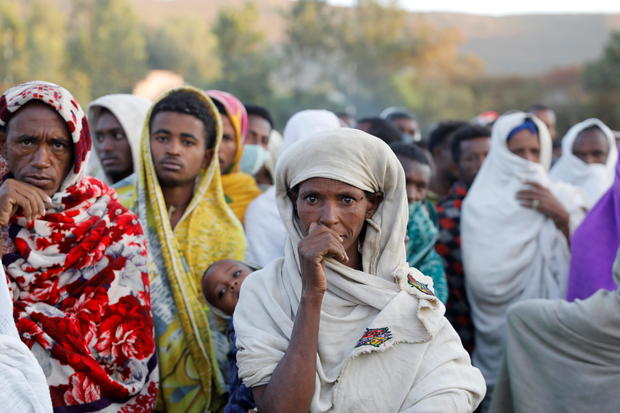BY PAMELA FALK
JUNE 16, 2021 / 3:08 AM / CBS NEWS
United Nations — In his harshest statement yet on the seven-month crisis in northern Ethiopia's Tigray region, U.N. Emergency Relief Coordinator Mark Lowcock told Security Council members Tuesday "there is now famine in Tigray." He put the blame squarely on forces from the neighboring nation of Eritrea.
"Eritrean soldiers are using starvation as a weapon of war," he said.
Lowcock painted a brutal picture. "Rape is being used systematically to terrorize and brutalize women and girls. Aid workers have been killed, interrogated, beaten, blocked from taking aid to the starving and suffering and told not to come back," he told diplomats in a closed briefing at an informal dialogue of the U.N. Security Council that was requested by the Mission of Ireland.
Ireland's U.N. Ambassador, Geraldine Byrne Nason called the situation an "unfolding humanitarian catastrophe."
"Now, we are at a tipping point," she said.
 A woman stands in line to receive food donations at the Tsehaye primary school, which was turned into a temporary shelter for people displaced by conflict, in the town of Shire in the Tigray region of Ethiopia on March 15, 2021. BAZ RATNER / REUTERS
A woman stands in line to receive food donations at the Tsehaye primary school, which was turned into a temporary shelter for people displaced by conflict, in the town of Shire in the Tigray region of Ethiopia on March 15, 2021. BAZ RATNER / REUTERS"Ignorance is dangerous. Denial is unforgiveable."
"Despite all we have told you of the widespread and systematic scale of the rapes, we continue to receive horrific reports of widespread sexual violence," Lowcock said, clearly frustrated by the lack of action from the 15-nation council.
Lowcock outlined three areas where progress is "urgently" needed: humanitarian access, funding, and a hastening of the pace of aid.
"Ignorance is dangerous. Denial is unforgiveable," he warned, saying there is a "duty" to "do something."
Fighting in Ethiopia broke out in November 2020 between government troops and Tigrayans. Eritrea sent forces across the border to help Ethiopian troops.
The Biden administration has spoken out. Last month, citing continuing atrocities, Secretary of State Antony Blinken called on the "governments of Eritrea and Ethiopia to take all necessary steps to ensure that their forces in Tigray cease and desist this reprehensible conduct."
U.S. Ambassador to the U.N., Linda Thomas Greenfield scolded the council last week, asking, "Do African lives not matter?" and taking issue with the lack of a single public meeting on the crisis.
U.S. AID Administrator Samantha Power called on the Security Council's three African members to put the issue on the agenda.
Council members weigh in
After Tuesday's U.N. meeting, those three nations - Niger, Tunisia, and Kenya - along with St. Vincent and the Grenadines, issued a statement saying they, "share in the concern for the humanitarian needs faced by 17.1 million Ethiopians including people in the Tigray region." The four nations said they are concerned about "reports of sexual violence against women and girls."
They called on Ethiopia to "conduct thorough investigations into these atrocities."
Not mentioning famine in the statement, the nations cautioned, "Any action by the Security Council must recognize and respond to the reality that Ethiopia is finalizing preparations for an election that is barely a week away."
Ethiopia's U.N. ambassador, Taye Atske Selassie Amde, who was at the meeting, said Eritrean forces "will definitely leave soon," a commitment that Eritrea also made in April – and one that hasn't happened.
Later in the evening, Ireland's Byrne Nason told CBS News, "Ireland has been on the Security Council for six months, and in those six months we have never looked away from this developing catastrophe in Tigray."
She said, "We need unhindered humanitarian access to the hundreds of thousands already in immediate danger of starvation, we need to ensure humanitarian workers and supplies are safe, and we need to end all violence."
"Ultimately, a political solution is needed, and Ireland certainly called for that today, but while we work towards that, our number one priority is ensuring that no more lives are lost," Byrne Nason added.
Russian Deputy Ambassador Anna Evstigneeva, who attended the meeting, told CBS News in a statement, "We take the humanitarian challenges that Ethiopia faces very seriously." She said "humanitarian agencies should scale up their assistance with full respect to and in close coordination with the sovereign authorities."
"We oppose any politicization of humanitarian situations, including in Tigray," Russia's envoy said.
U.K. Ambassador to the U.N. Barbara Woodward spoke to reporters after the closed dialogue, saying she was disappointed that nations on the Council have not been able to agree to a meeting in public, saying that "without a ceasefire, this could become a man-made famine."
First published on June 16, 2021
© 2021 CBS Interactive Inc. All Rights Reserved.
Pamela Falk

Pamela Falk is CBS News Foreign Affairs Analyst and an international lawyer, based at the United Nations.
No comments:
Post a Comment